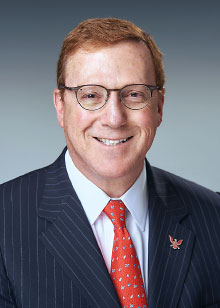Levin Elected Secretary General of WPA
Abstract
The World Psychiatric Association (WPA) is the global association representing 145 psychiatric societies and more than 250,000 psychiatrists in 121 countries.

APA CEO and Medical Director Saul Levin, M.D., M.P.A., was elected secretary general of the World Psychiatric Association (WPA) during the WPA’s 23rd World Psychiatric Congress in Vienna, Austria, in September. As secretary general, Levin is one of eight elected representatives to the WPA’s Executive Council, which implements the decisions of the WPA General Assembly and administers WPA resources.
The secretary-general acts as liaison between the WPA board and committees and ensures members are kept informed of any discussions and decisions. The secretary-general also chairs the WPA Accreditation Committee.
“This is an exciting opportunity to work with psychiatric leaders from around the world,” said Levin. “The world community is focused on many of the same issues that American psychiatry has made a priority—access to quality mental health care, equal respect for psychiatry and the value of mental health to overall general health, integration of mental health treatment and medical care, the role of social determinants of health and mental health, and the importance of healthy lifestyles.
“We have something to learn from developing countries that have strived to extend mental health care to their populations despite scarce resources,” he said. “The WPA is an extraordinary venue for international collaboration.”
The 2023-2026 WPA Action Plan is focused on healthy lifestyles.
The WPA is the global association representing 145 psychiatric societies in 121 countries and representing more than 250,000 psychiatrists. It promotes collaborative work in all areas of psychiatry and has developed ethics guidelines for psychiatric practice and position statements on topics relevant to psychiatric practice and the role of psychiatrists. The WPA partners with its members to host the annual WPA World Congress of Psychiatry as well as regional and thematic congresses, attracting global leaders in mental health and providing forums for shared learning and collaboration to benefit their home countries.
And it provides assistance to societies that are isolated or whose members work in impoverished circumstances. APA’s Office of International Affairs works with the WPA and the APA Council on International Affairs and Global Health.
He said that as secretary general, a priority will be ensuring that the WPA has strong member-nation relationships, educational tools, and an increasingly strong financial footing going into the future.
In addition, other APA members will continue in their WPA roles. Bernardo Ng, M.D., a member and former chair of the APA Council on International Psychiatry and Global Health, was elected to a second three-year term as zonal representative for the United States. Ng has been instrumental in the development of LaSaludMental.org, APA’s Spanish language mental health website and has served on APA’s Scientific Program Committee.
He echoed Levin in urging American psychiatrists to become involved in the WPA. “There is also tremendous value to APA members who get involved in WPA congresses, and regional and thematic meetings and participate in different sections and committees,” he told Psychiatric News. “These activities allow anyone interested to learn from colleagues in other countries, showcase their research and clinical activities, and generate international alliances for future work.”
Continuing to serve on the WPA Executive Council are Edmond Pi, M.D., emeritus professor of clinical psychiatry and behavioral sciences at the University of Southern California, who is continuing as secretary of meetings, and past APA President Paul Summergrad, M.D., continuing as secretary of finances. Both were elected in 2020 for six-year terms and are members of APA’s Council on International Affairs and Global Health.
In comments to APA, Pi, who is also a member of APA’s Scientific Program Committee and the APA Foundation Board of Directors, said his goals as secretary of meetings are to increase the exchange of information between psychiatrists around the world and strengthen links between WPA member societies. “I look forward to continuing the achievements of the WPA; supporting and advocating for its members; and advancing the best clinical care, education, and research globally,” he said.
Summergrad said, “The World Psychiatric Association is a unique organization as it is able to respond across borders to support national organizations such as APA in their mission to advance science and psychiatric and other medical care.”
Participating in the 2023 meeting in Vienna were a number of APA leaders, including APA President Petros Levounis, M.D., M.A., and past presidents Rebecca Brendel, M.D., J.D., Dilip Jeste, M.D., Michelle Riba, M.D., and John McIntyre, M.D.
The 24th WPA World Congress of Psychiatry is scheduled for November 14 to 17, 2024, in Mexico City in partnership with the Mexican Psychiatric Association. ■



